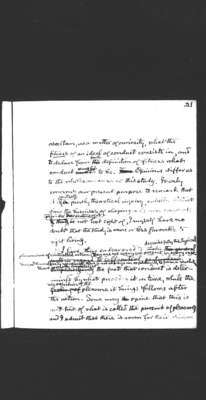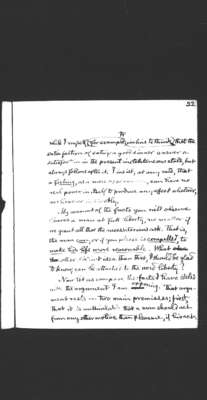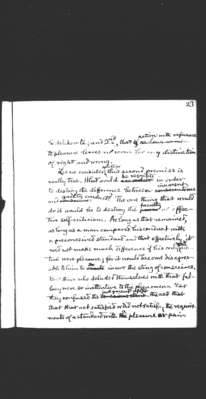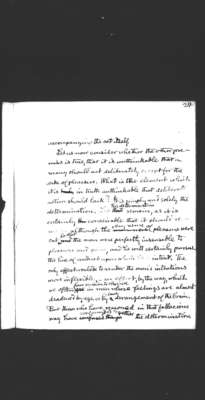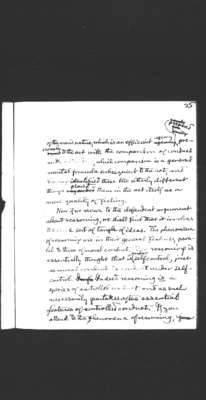Pages
26
21
ascertain, as a matter of curiosity, what the fitness of an ideal of conduct consists in, and deduce from such definition of fitness what conduct ought to be. Opinions differ as to the wholesomeness of this study. It only concerns our present purpose to remark that it is in itself pureky theoretical inquiry, entirely distinct from the business of shaping one's own conduct. Provided that [?eatine] of it be not lost sight of, I myself have no doubt that the study is more or less favorable to right living.
I have thus endeavored to describe fully the typical phenomena of ontrolled action. They are not everyone present in every case. Thus, as I have already mentioned there is not always an opportunity to form a resolution I have specially emphasized the fact that conduct is determined by what precedes it in time, while the recognition of the pleasure it brings follows after the action. Some may opine that this is not true of what is called the pursuit of pleasure, and I admit that there is room for their opinion
27
22
while I myself for example, incline to think that the satisdaction of eating a good dinner is never a satisfaction in the present instantaneous state, but always follow after it. I insist, at any rate, that a feeling, as a mere appearance, can have no real power in itself to produce any effect whatever, norhowever indirectly.
My account of the facts you will observe leaves a man at full liberty, no matter if we grant all that the necessitarians ask. That is, the man can, or if you please is compelled to make his life more reasonable. What other distinct idea than that, I should be glad to know, can be attached to the word liberty?
Now let us compare the facts I have states with the argument I am opposing. That argument rests on two main premissed; first, that it is unthinkable that a man should act from any other motive than pleasure, if his act
28
23
be deliberate; and 2nd, that action with reference to pleasure leaves no room for any distinction of right and wrong.
Let us consider whether this second premiss is really true. What would be requisite in order to destroy the difference between innocent and guilty conduct? The one thing that would do it would be to destroy the faculty of effective self-criticism. As long as that remained, as long as a man compared his conduct with a preconceived standard and that effectively it need not make much difference if his only real motive were pleasure; for it would become disagreeable to him to incur the sting of conscience. But those who deluded themselves with that fallacy were so inattentive to the phenomena that they confused the judgement after the act that that that act satisfied or did not satisfy the requirements of a standard with a pleasure or pain
29
24
accompaning the act itself.
Let us now consider whether the other premiss is true, that it is unthinkable that a many should act deliberately except for the sake of pleasure. What is the element which it is in truth unthinkable that deliberate action should lack? It is simply and solely the determination. [ast] his determination remain, as it is certainly conceivable that it should remain although the very nerve of pleasure were cut so that the man wete perfectly insensible to pleasure and pain, and he will certainly pursue the line of conduct upon which he is intent. The only effect would be to render the man's intentions more inflexible, - an effect, by the way, which we often have occasion to observe in men whose feelings are almost deadened by age or by some derangement of the brain. But those who have reasoned in this fallacious way have confounded together the determination
30
25
of the man's nature, which is an efficient agency prepared previously to the act with the comparison of conduct with a standard, which comparison is a general mental formula subsequent to the act, and having identified these two utterly different things places them in the act itself as a mere quality of feeling.
Now if we recur to the defendent argument about reasoning, we shall find that it involves the same sort of tangle of ideas. The phenomena of reasoning are in their general fealines, parallel to those of moral conduct. For reasoning is essentially thought that is under self control, just as moral conduct is conduct under self-control. Indeed reasoning is a species of controlled conduct and as such necessarily partakes of the essential features of controlled conduct. If you attend to the phenomena of reasoning,
